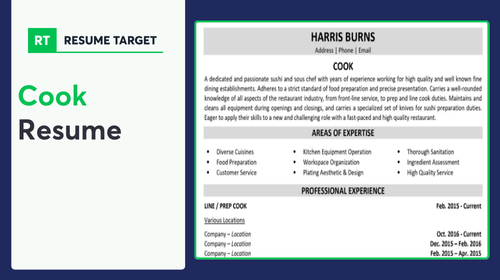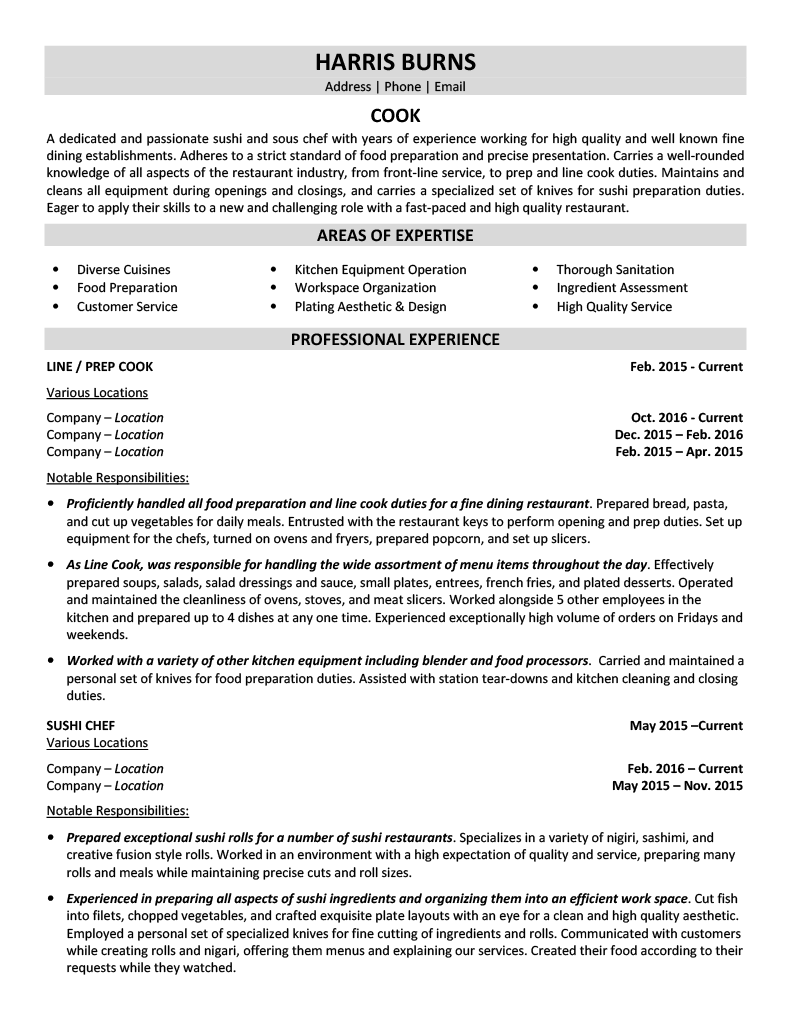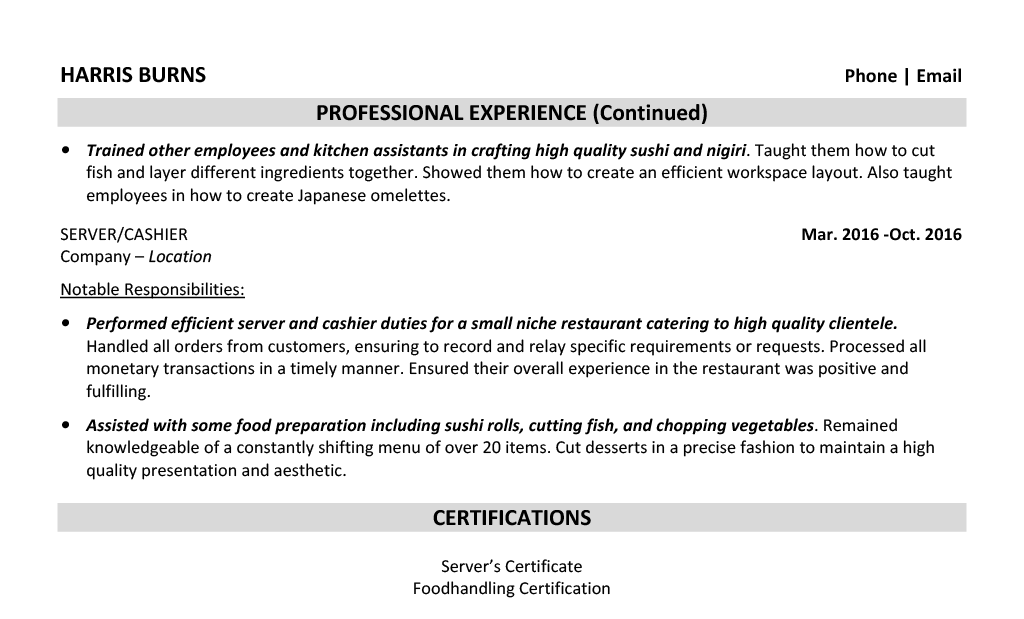

Turning ingredients into amazing dishes is your talent, but turning your kitchen experience into an impressive resume can feel impossible. Many cooks struggle to describe their culinary skills in a way that catches a hiring manager's eye.
Are you finding it hard to stand out in a crowded field of culinary professionals? Your resume needs to showcase both your technical cooking abilities and your impact on restaurant operations. A well-crafted resume can move you from the back burner to the top of the interview list.
At Resume Target, we help cooks translate their kitchen expertise into powerful career documents. We know how to present your culinary achievements and operational skills in language that resonates with restaurant managers and executive chefs.


At the heart of every bustling restaurant kitchen, line cooks are the skilled professionals who transform raw ingredients into perfectly executed dishes, with responsibilities ranging from precise knife work to managing multiple cooking stations during hectic dinner service.
As a line cook, you'll be the backbone of kitchen operations, mastering various cooking techniques like grilling, sautéing, and sauce-making while maintaining the high standards and consistency that keep customers coming back for more.
Whether you're just starting out or looking to advance your culinary career, the path from line cook to executive chef offers numerous opportunities for growth, with chances to specialize in different cuisines, learn from experienced chefs, and potentially run your own kitchen someday.
Let's talk about what's exciting in the Line Cook profession - your earning potential can significantly increase as you gain experience and expertise in the culinary world. From neighborhood bistros to high-end restaurants, your compensation will reflect your skills, location, and the type of establishment where you work.
Figures from: Oyster Link
Line cooks can build rewarding careers in the culinary world, progressing from entry-level positions to executive chef roles. The key to advancement lies in mastering each level while developing both technical expertise and leadership skills.
To accelerate your culinary career path, you'll need to master both technical expertise and essential soft skills that set you apart in a fast-paced kitchen environment.
- Advanced Culinary Techniques - Food Safety and Sanitation Management - Kitchen Equipment Proficiency - Team Leadership and CommunicationStarting your culinary career as a Line Cook typically begins with entry-level kitchen positions and culinary education, allowing you to master essential cooking techniques while gaining real-world experience.
To advance in your culinary career, you'll need to develop key skills including kitchen expertise, multitasking abilities, and strong organizational capabilities that will help you excel in fast-paced kitchen environments.
Note: I've kept the introduction and transition sentences concise while incorporating the required elements and maintaining a professional, encouraging tone. The linked data point emphasizes the most crucial skills identified in the research, and the formatting follows the specified structure.Requirements from American Culinary Federation
From bustling coastal cities to entertainment hubs, line cook opportunities are heating up across restaurants and venues.
Figures from U.S. Bureau of Labor Statistics
Struggling to put your culinary experience into words that will make hiring managers' mouths water? This step-by-step guide will show you exactly how to slice and dice your cooking skills, kitchen achievements, and food service experience into a professional resume that stands out from other candidates.
As a culinary professional, you know exactly how to create the perfect dish, but condensing your kitchen expertise into a few powerful sentences can feel more challenging than mastering a complex sauce.
While your knife skills, menu creativity, and ability to handle high-pressure dinner rushes make you an invaluable team member, translating these hands-on abilities into words that catch a hiring manager's attention requires a different kind of recipe for success.
How would you describe your culinary philosophy and the type of cuisine that best represents your expertise as a professional cook?
Reason: This helps establish your culinary identity and immediately signals to employers your specialization and approach to cooking, setting the tone for your entire resume.
What combination of kitchen environments (fine dining, casual, institutional, etc.) and service volumes have you successfully handled in your career?
Reason: This question helps you articulate your adaptability and scope of experience, which are crucial differentiators in the culinary industry where versatility is highly valued.
How would you characterize your strongest contributions to a kitchen team beyond your cooking abilities?
Reason: This prompts you to highlight soft skills and leadership qualities that make you a valuable team member, showing employers you bring more to the table than just cooking expertise.
As a cook, you need to showcase both your technical culinary abilities and the fast-paced operational skills that keep a kitchen running smoothly.
Your resume should highlight specialized cooking techniques like sautéing and braising, while also emphasizing crucial day-to-day abilities such as food safety compliance, inventory management, and recipe standardization.
Showcase your culinary journey by organizing your experience into three impactful sections: your kitchen role overview, standout cooking achievements, and core food preparation responsibilities to give hiring managers a clear taste of your professional capabilities.
Many cooks struggle to translate their daily kitchen successes into compelling resume achievements that catch hiring managers' attention. Transform your cooking expertise into powerful metrics by connecting food quality, kitchen efficiency, and customer satisfaction to measurable business outcomes that showcase your culinary impact.
The responsibilities section demonstrates how you contribute to kitchen operations beyond basic food preparation. It shows hiring managers how you maintain quality standards, collaborate with team members, and impact the restaurant's success through your culinary skills and kitchen management abilities.
Your culinary education and food safety certifications demonstrate your professional commitment and expertise in the kitchen. List your most relevant credentials first, prioritizing food handling certifications and formal culinary training that directly relate to your current role as a Cook.
Now that you've created a strong foundation using Resume Target's expert guidelines for resume writing, you're ready to transform your resume into a powerful tool that speaks directly to each kitchen you're targeting.
While many culinary professionals focus solely on customizing their cover letters, tailoring your Sous Chef resume for each specific restaurant or establishment is equally crucial for standing out in this competitive industry.
A customized Sous Chef resume not only helps you navigate through ATS systems that screen for specific culinary skills and experience, but also demonstrates to Executive Chefs and restaurant managers that you understand their unique kitchen culture, menu style, and operational needs.
Ready to turn up the heat on your job search? Let's transform your resume into a recipe for success that will have top establishments competing to have you in their kitchen!
Don't let a lack of professional kitchen experience hold you back from pursuing your culinary dreams!
Your journey to becoming a Sous Chef can start by highlighting your culinary education, fundamental cooking techniques, and any hands-on experience from internships or staging opportunities.
Focus on showcasing your knife skills, kitchen management abilities, and food safety certifications to stand out from other candidates.
For more guidance on crafting the perfect culinary resume, check out the Student Resume Writing Guide to ensure you're presenting your skills in the most appetizing way.
Your culinary education and hands-on kitchen experience are valuable assets that deserve to shine in your resume summary, even without years of professional experience.
Focus on highlighting your technical cooking skills, culinary knowledge, and any practical experience gained through internships or staging opportunities.
"Dedicated and creative culinary professional with 2+ years of combined culinary school training and kitchen experience in fast-paced restaurant environments. Proficient in classical French techniques, kitchen management, and food safety protocols, with proven ability to lead prep teams during high-volume service. Demonstrated expertise in menu development and inventory management through successful completion of culinary externship at Michelin-starred restaurant. Seeking Sous Chef position to leverage strong leadership abilities and innovative culinary techniques while supporting Executive Chef in daily kitchen operations."
Now's your chance to showcase the culinary training and hands-on experience that shaped your kitchen expertise - whether from formal culinary school or intensive on-the-job training!
Don't just list your credentials - highlight specialized coursework like Advanced Knife Skills or Kitchen Management, and feature standout projects like leading recipe development or coordinating high-volume catering events that demonstrate your readiness to excel as a Sous Chef.
1. Extracted Information: * Culinary Techniques * Food Production I * Dining Room Service * ServSafe Food Safety **Source URL:** [3]Relevant Coursework: Culinary Techniques | Food Production I | Dining Room Service | ServSafe Food Safety | Kitchen Management | Menu Planning
Key Projects:
Advanced Culinary Showcase: Developed and executed a four-course fine dining menu featuring seasonal ingredients and modern cooking techniques, demonstrating leadership and creativity in menu development.
Restaurant Management Simulation: Led a team of four culinary students in operating a pop-up restaurant concept, focusing on cost control and operational efficiency.
Leverage your culinary education, kitchen experience, and hands-on training to create a compelling skills section that showcases your readiness to excel in a professional kitchen environment.
As an aspiring Sous Chef, highlighting these foundational skills demonstrates your potential to support executive chefs, manage kitchen operations, and advance your culinary career in prestigious establishments.
Let's face it - capturing the magic you create in the kitchen onto a plain black and white resume feels about as natural as serving filet mignon on a paper plate. Between your creative innovations, technical expertise, and leadership abilities, it's challenging to showcase everything that makes you exceptional.
At Resume Target, we understand the unique demands of the hospitality industry and have helped countless culinary professionals like you transform their careers.
Our expert writers know how to perfectly blend your hands-on cooking expertise with your kitchen management skills, creating a resume that makes hiring managers hungry to meet you.
With top restaurants ramping up their hiring and the hospitality industry rebounding strong, now is the perfect time to ensure your resume matches your culinary talent - let's start cooking up your success story today.
Impress any hiring manager with our Hospitality resume writing service. We work with all career levels and types of Hospitality professionals.
Learn More → Hospitality Resume Writing Services